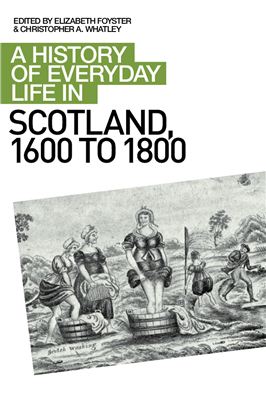Edinburgh University Press, 2010. - 352 pages.
The experiences of everyday Scotland has undergone profound political, religious, and economic change over the past two centuries. This team of authors examine how far the extraordinary has impinged on the Scottish ordinary and the extent to which population growth, urbanization, agricultural developments, and political and religious upheaval have impacted the daily pattes, rhythms, and rituals of common people.
The authors uncover a wealth of surprising detail about the anxieties, joys, comforts, passions, hopes, and fears of Scots, tracing how the impact of change varies according to geographical location, social position, and gender. The authors draw on a wide and eclectic range of primary and secondary sources, including the material remains of town and country life. Also consulted are artifacts of govement, religion, ideas, painting, literature, and architecture, providing fresh insight into how Scots communicated with each other, understood themselves, managed social conflict, and coped with illness and death.
The experiences of everyday Scotland has undergone profound political, religious, and economic change over the past two centuries. This team of authors examine how far the extraordinary has impinged on the Scottish ordinary and the extent to which population growth, urbanization, agricultural developments, and political and religious upheaval have impacted the daily pattes, rhythms, and rituals of common people.
The authors uncover a wealth of surprising detail about the anxieties, joys, comforts, passions, hopes, and fears of Scots, tracing how the impact of change varies according to geographical location, social position, and gender. The authors draw on a wide and eclectic range of primary and secondary sources, including the material remains of town and country life. Also consulted are artifacts of govement, religion, ideas, painting, literature, and architecture, providing fresh insight into how Scots communicated with each other, understood themselves, managed social conflict, and coped with illness and death.

